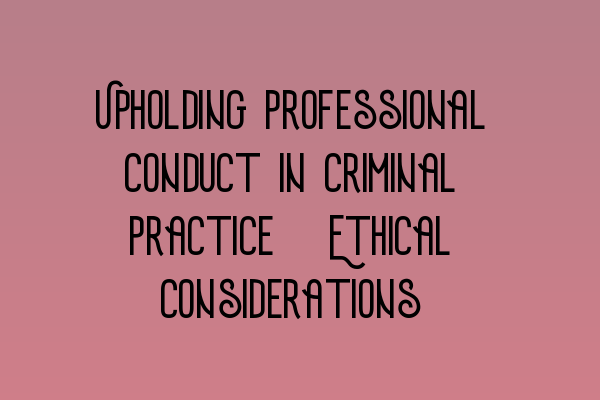Upholding Professional Conduct in Criminal Practice: Ethical Considerations
As legal professionals, it is our duty to uphold the highest standards of professional conduct in criminal practice. Ethical considerations play a vital role in ensuring that the justice system functions fairly and efficiently. In this article, we will explore key ethical principles and the importance of adhering to them in criminal law.
The Role of Professional Conduct in Criminal Practice
Professional conduct refers to the behavior and ethical standards expected of legal professionals. In criminal practice, where the stakes are high and the impact on individuals’ lives profound, upholding professional conduct becomes even more crucial.
One of the fundamental ethical principles is the duty to act in the best interests of the client. This means providing competent and zealous representation, regardless of the client’s guilt or innocence.
It is important to remember that professional conduct extends beyond the courtroom. Legal professionals must maintain integrity, honesty, and objectivity in all aspects of their work. This includes interactions with clients, opposing counsel, and the judiciary.
Confidentiality and Attorney-Client Privilege
Confidentiality is a cornerstone of the attorney-client relationship. Clients must feel comfortable sharing sensitive information with their legal representatives, knowing that it will be kept confidential.
Attorney-client privilege goes hand in hand with confidentiality. This legal protection ensures that communications between a lawyer and their client remain privileged and cannot be disclosed without the client’s consent, even in court.
To ensure compliance with confidentiality and attorney-client privilege, legal professionals must exercise the utmost care when handling client information. This includes using secure communication channels, properly storing and disposing of documents, and avoiding any unauthorized disclosures.
For more information on the importance of protecting client confidentiality and attorney-client privilege, you can read this SQE 1 Practice Exam Questions article.
Conflict of Interest
A conflict of interest arises when a lawyer’s professional obligations to one client come into conflict with their obligations to another client or a third party. Identifying and managing conflicts of interest is essential to maintain the integrity of the legal profession.
Legal professionals must conduct thorough conflict checks before agreeing to represent a client. This involves assessing whether there are any relationships, interests, or obligations that may compromise their ability to provide unbiased and loyal representation.
If a conflict of interest does arise, it is crucial to promptly disclose it to the affected parties and take appropriate measures to resolve the conflict. This may involve seeking informed consent, withdrawing from representation, or implementing safeguards to mitigate the conflict.
Providing Accurate and Honest Advice
Legal professionals have a duty to provide accurate and honest advice to their clients. This means providing informed guidance based on an objective assessment of the law and the client’s circumstances.
It is essential to avoid making misleading or exaggerated claims about the likely outcome of a case. Providing honest advice allows clients to make informed decisions and maintain realistic expectations about the potential outcomes of their legal matters.
For further guidance on providing accurate and honest advice, you can refer to this SQE 1 Practice Mocks FLK1 FLK2 article.
Continuing Professional Development
Staying up to date with legal developments is vital for legal professionals to provide effective representation to their clients. Continuing professional development (CPD) ensures that lawyers stay informed about changes in the law, legal precedents, and best practices.
Participating in relevant training courses and attending seminars and conferences helps lawyers maintain their competence and enhance their legal skills. Regular CPD demonstrates a commitment to professional growth and a dedication to providing quality legal services.
For information on available SQE 2 preparation courses, you can visit this SQE 2 Preparation Courses article.
Conclusion
Upholding professional conduct in criminal practice is essential for maintaining the integrity of the justice system. By adhering to ethical principles such as client confidentiality, avoiding conflicts of interest, providing accurate advice, and engaging in CPD, legal professionals can ensure the fair and efficient administration of justice.
For information on SQE 1 preparation courses or upcoming SRA SQE exam dates, you can visit these articles: SQE 1 Preparation Courses and SRA SQE Exam Dates.
